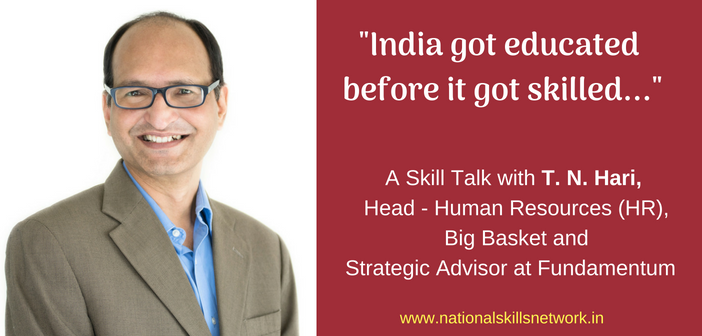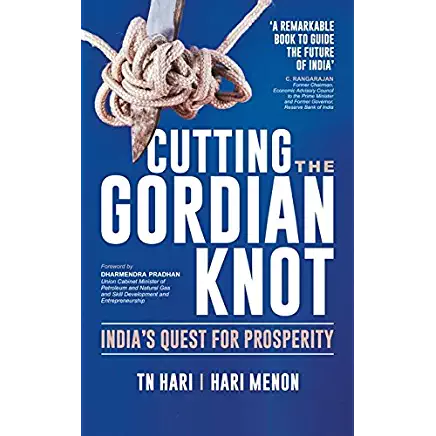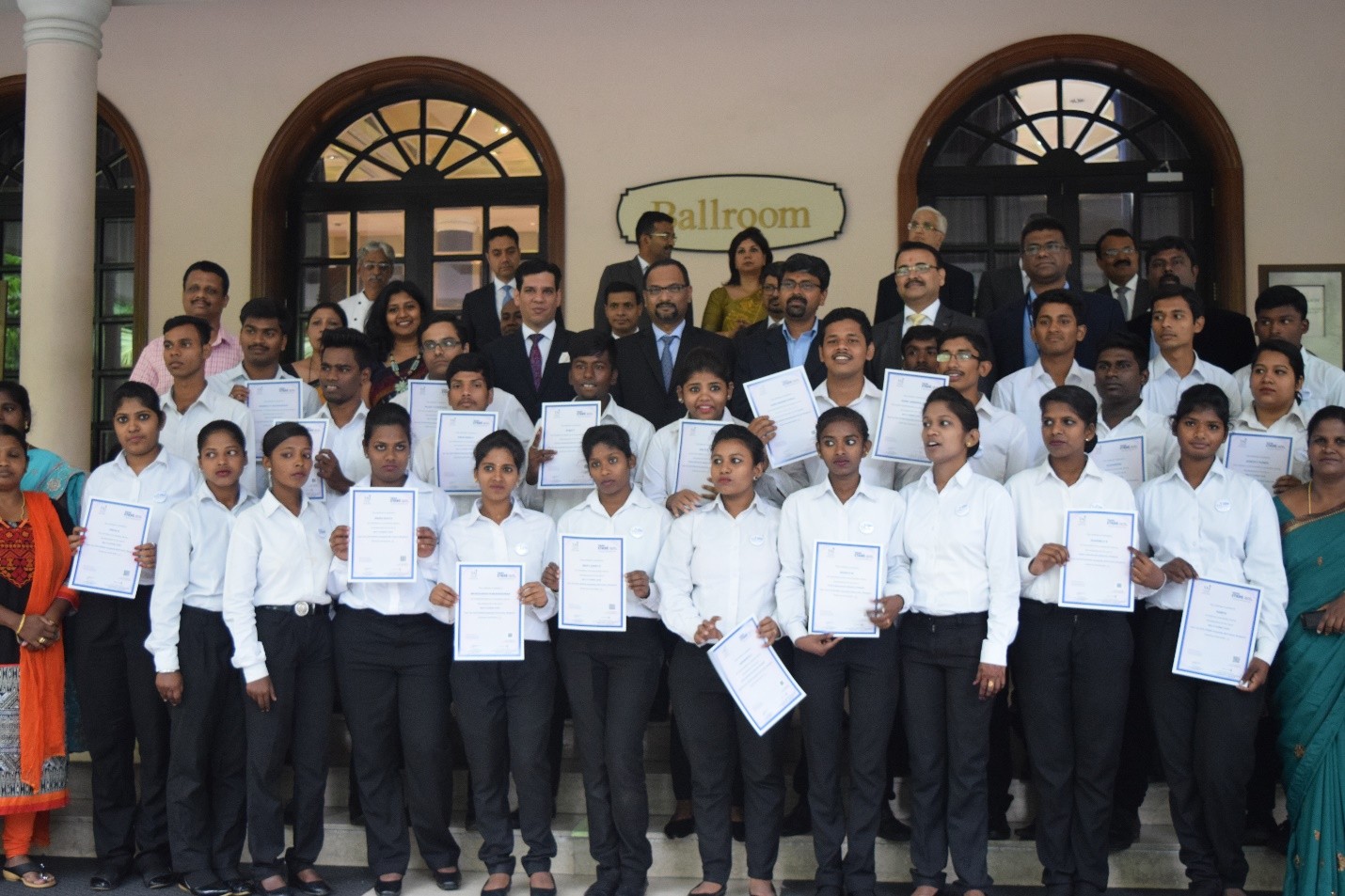One of the serious concerns about skill development has been the role of the industry and the responsibilities of the Human Resources (HR) teams in ensuring that they recruit the rightly skilled candidates for the right jobs. To understand the industry perspective in the context of the big picture of skills and jobs, we caught up with T. N . Hari, Head – Human Resources (HR), Big Basket and Strategic Advisor at “Fundamentum”. In this Skill Talk, Hari shares his perspective and advice with regard to skilling, education, on-the-job training and his upcoming book, “Cutting the Gordian Knot – India’s Journey towards Acche Din” co-authored with Hari Menon, Co-Founder and CEO, Big Basket. T. N. Hari is actively involved in strengthening the evolving startup ecosystem in India as an advisor and mentor to numerous young entrepreneurs and startups.
Q: How do you perceive the evolving 3E (Education, Employment and Entrepreneurship) ecosystem in India.
A: I think this is biggest thing to happen since independence; and the most sincere and comprehensive attempt at addressing India’s jobs problem. If China became old before they became rich, then India got educated before we got skilled. This lopsided development of Indian society needs to be corrected. This is not easy. There are several dimensions to the jobs problem.
I am very glad that this government has taken skilling seriously and is trying its best to address the issues. Complex problems often defy simple solutions. They need collaboration between all stakeholders which include the Government, NGOs, Industry, Opposition and thought leaders. Everyone needs to jump into the pond and participate. No one can afford to just be a critic.
Every government has its political compulsions and this government too has some of these, but the point is that the focus on the bigger picture and efforts to drive transformation at double speed are evident and outweighing the negatives. It is not that the government did not falter along the way. There were some missteps, but the willingness to accept mistakes and make course corrections indicate an honesty of purpose. Without everyone’s support and active participation the jobs problem cannot be solved.

Q: Focus on skilling will create a surplus supply of talent, how do we align it with the industry demand and make industry pay for skilled workforce (particularly SMEs and MSMEs).
A: Yes, excessive focus on creating skills will result in a surplus of talent. Centralized planning has this deficiency, which is pile up of inventories with no takers. A strong ‘demand’ component needs to somehow be built into this process. Building demand into skilling is not an easy process and hence there is always a temptation to go the easy route of creating supply. Here are some thoughts on how to build demand into the process:
-
Demand-supply match through education and skills
Let’s look at education to see if there are some helpful parallels for skilling. The success of education was that over a period of time, industry accepted ‘education’ standards. For example, industry accepted that some jobs need a degree in engineering, some jobs require a diploma in engineering while some other jobs just needed someone with just a science background in high school. Because these education requirements became standards for different types of jobs, the demand got beautifully channeled into supply in the form of institutions that churned out this talent.

We need something very similar for skilling. We need to set certain standards and get near universal acceptance for these standards. One of the challenges in replicating this approach in skilling has been that industry does not seem to believe that skills are important or rather they believe that skills are easily taught at work. Be that as it may, we should have independent bodies do a Recognition of Prior Learning (RPL) and hand out authentic certificates. In my opinion, this will result in linking skilling and demand over a period of time even for relatively low skilled jobs.
I’ve always maintained that India got Educated before it got Skilled. As a result we are able to send a mission to Mars but struggle to build elementary urban infrastructure like drainage systems. We need to make some basic changes to education systems and create alternate practical programs. We need to change the paradigm on education and focus on education that enhances employability.
2. The fallout of just-in-case education
Most of what is taught in medicine in the 10 years is never used in practice. The entire curriculum is designed to cover every possible scenario and ailment. Some experts call this a ‘just in case’ approach to professional education. This has resulted in every hospital, government-run or private, in every town and village of India having a severe shortage of doctors. This is clearly a self-inflicted problem. On the one hand we have millions of youth who are unemployed and on the other hand, we have every hospital and primary health care centre suffering from a shortage of doctors. Why are we so cut up on the ten odd year doctor education programme? It is not that we do not need doctors who have gone through a 10-year programme.
However, if we insist that any kind of healthcare, however elementary it may be, would be provided only by such doctors or not at all, then we have a big problem at hand. We need to create alternate and meaningful short programmes that are relevant to our situation. Good doctor-assistants in villages and towns can address a lot of our healthcare issues. What is needed on the part of the regulatory body like the medical council is agility in addressing this by creating meaningful courses and giving them legitimacy.
One can see the same situation manifest itself in all the other professions as well. You do not need a full-fledged ophthalmologist to do basic tests to figure out what should be the power of the glasses for a visually impaired patient. You could have individuals who are trained through some kind of a short-term programme accredited by a government body to use the equipment and prescribe glasses.
Q: What is your opinion about short-term skilling programs, please give examples of industry sectors where it can help
 A: In my opinion, short term skilling programs tend to be industry-specific and for jobs that do not really require a lot of skill. However, for people to move up the career/job ladder, it is essential to upskill. Lack of authentic certification methods is resulting in the workforce in these jobs becoming an undifferentiated commodity. For differentiation to happen, certification followed by wage differentials and differentials in earning opportunities is critical. Technology platforms that have created a smooth marketplace for skills (like UrbanClap, Uber, Ola) or even just technology platforms that capture and share user experiences (TripAdvisor), have created an impetus for upskilling since upskilling results in better ratings and better earnings potential.
A: In my opinion, short term skilling programs tend to be industry-specific and for jobs that do not really require a lot of skill. However, for people to move up the career/job ladder, it is essential to upskill. Lack of authentic certification methods is resulting in the workforce in these jobs becoming an undifferentiated commodity. For differentiation to happen, certification followed by wage differentials and differentials in earning opportunities is critical. Technology platforms that have created a smooth marketplace for skills (like UrbanClap, Uber, Ola) or even just technology platforms that capture and share user experiences (TripAdvisor), have created an impetus for upskilling since upskilling results in better ratings and better earnings potential.
Q: Tell us about Big Basket’s HR strategy to recruit and retain migrants/youth from rural places, do you engage apprentices as well?
 A: We do not have the competence to recruit youth from rural places. Therefore, we tie up with partners who have this competence. The core components of this competence are a) reach and connect with rural youth, and b) ability to mobilize. We are building long-term partnerships with partners who possess this capability. Some of them are private bodies and some are semi-government.
A: We do not have the competence to recruit youth from rural places. Therefore, we tie up with partners who have this competence. The core components of this competence are a) reach and connect with rural youth, and b) ability to mobilize. We are building long-term partnerships with partners who possess this capability. Some of them are private bodies and some are semi-government.
The apprenticeship model works well in an environment when demand for skills is less than the supply of raw talent that could be moulded for these skills. In such a system, industry can be encouraged to give back to society (and in the process also create a pool that can come handy when they grow) through an apprenticeship program. Typically in such an environment skilling can be built over a longer time frame by being apprenticed with someone who has a mastery in the skill.
However, the apprenticeship program does not work well when it comes to the e-commerce industry where the demand is for delivery and warehousing staff. Even by paying them high salaries, we are unable to find people in the required numbers because supply is lagging behind the demand. When people are not available even with offer of a high salary and full time employment, then an apprenticeship program is not the solution.
Q: How is Big Basket facilitating movement of workforce /enterprises from informal to the formal sector with reference to the key elements in value chain of e-commerce.
A: To my mind the difference between the informal and the formal sector is about social security, wage levels, coverage under the applicable labor laws, and commitment to a more long-term relationship. We are committed to all these four aspects of formalization for our workforce, whether they are on our rolls or outsourced to a third party.
Q: Tell us about your upcoming book, “Cutting the Gordian Knot –India’s Journey towards Acche Din”.
 A: We have covered many aspects of skilling and employability very comprehensively in our book. I truly believe we are at a unique juncture in our history in terms of our demographic profile. If we handle it well our youth bulge would truly result in a massive dividend and result in a happy nation. If not, it could result in massive law and order problems and widespread crime. India has made strides in solving many of these problems. These are inherently complex and difficult topics that straddle sociology, politics, economics, government, non-governments and industry. Some worthy initiatives and bold change-makers, both from within the government and from the outside, are leading from the front when it comes to our human capital challenges.
A: We have covered many aspects of skilling and employability very comprehensively in our book. I truly believe we are at a unique juncture in our history in terms of our demographic profile. If we handle it well our youth bulge would truly result in a massive dividend and result in a happy nation. If not, it could result in massive law and order problems and widespread crime. India has made strides in solving many of these problems. These are inherently complex and difficult topics that straddle sociology, politics, economics, government, non-governments and industry. Some worthy initiatives and bold change-makers, both from within the government and from the outside, are leading from the front when it comes to our human capital challenges.
The government is clearly demonstrating that it means business and is becoming extremely accessible and willing to listen to those seriously committed to solving these problems. The resolve for driving change with speed has never been as earnest as it is today! Yet, it is not sufficient given the enormity of the problems. Those working on these problems need to be recognised and encouraged even more. Some of their work goes somewhat unnoticed because it is not glamorous. We thought it was time to bring our quest for prosperity and job creation, along with all the underlying pieces, to the mainstream agenda! We tried to do that with this book.
Disclaimer: The content (text, pictures, videos, slideshows and audio) are provided and approved for publishing by the client who is featured in this article. National Skills Network – NSN is not responsible for any copyright or related issues with any type of content. However, few pictures might have been picked up from the Internet – free domain, in case of concern, please write to contact@nationalskillsnetwork.com














Comments 1